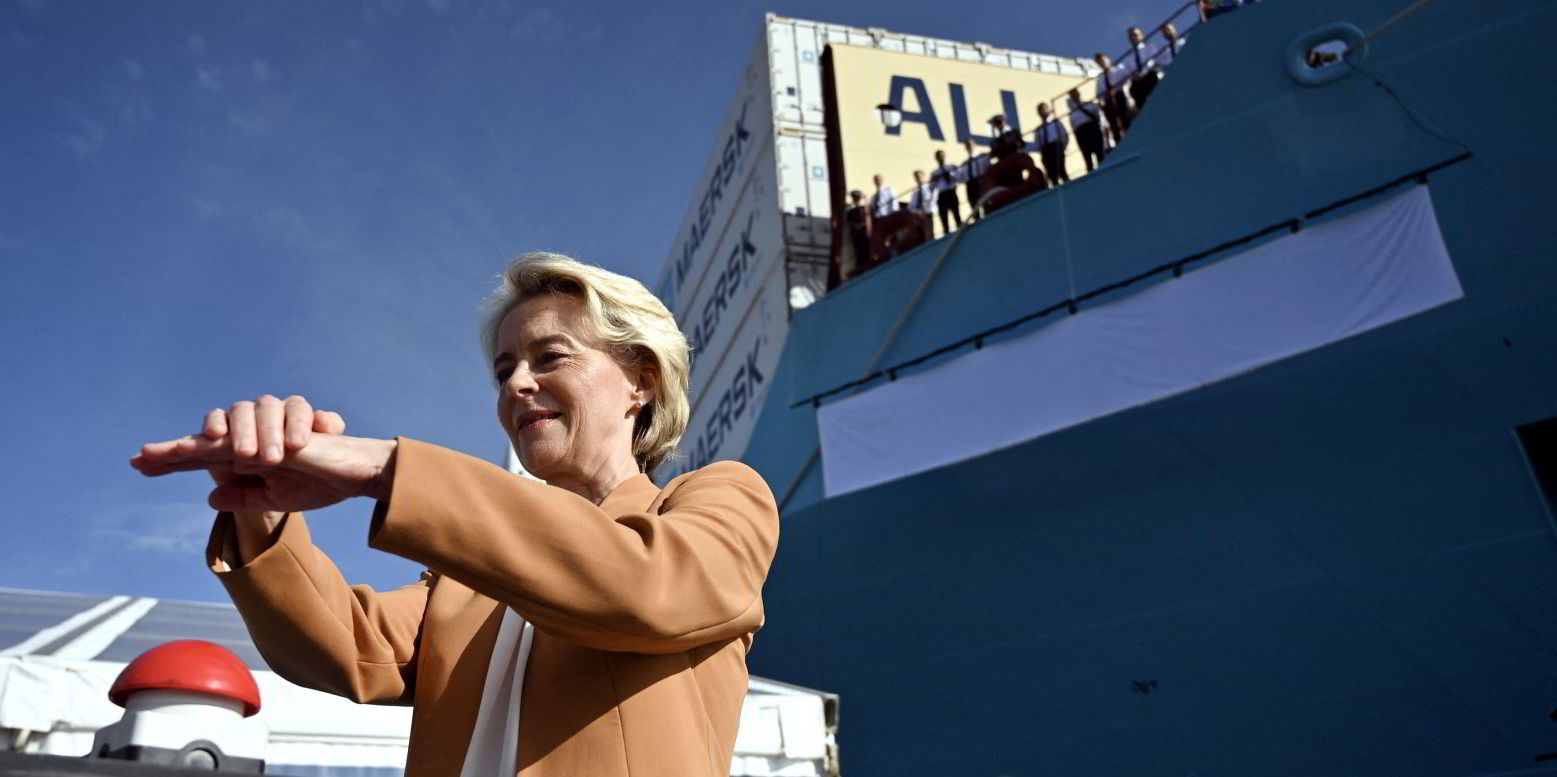It’s a new dawn for alternative fuels in container shipping, now that AP Moller-Maersk has inaugurated the world’s first methanol-fuelled boxship.
The audio edition of Green Seas will examine the future of methanol-fuelled container shipping with interviews with TCT Shipbrokers’ Richard Wetzki and OCI Global’s Ahmed El-Hoshy.
Subscribe on Google Podcasts, Apple Podcasts, Stitcher, Pandora, Spotify or SoundCloud to get it delivered to your mobile device.
The 2,100-teu Laura Maersk (built 2023) has been christened, but it is the first of many. Maersk followed up the first order with contracts for 24 methanol-fuelled ships — all but two of its current orderbook.
Several rivals followed with orders of their own. Data from shipbroker Clarksons shows that there are 165 methanol-fuelled ships on order, most in the container ship sector.
Methanol has been around for some time. Also known as methyl alcohol and even wood spirits, it was one ingredient in ancient Egyptian embalming chemicals before it was first isolated in 1661 by chemist Robert Boyle, according to the Chemeurope’s Encyclopedia of Chemistry.
And Maersk is not the first user of the fuel for shipping. Waterfront Shipping, a unit of methanol producer Methanex, has been running its tankers on the fuel since 2016.
However, interest in the fuel has gathered steam as shipping faces pressure to decarbonise. The industry is poised to enter the European Union Emissions Trading System in a few months, followed by the carbon intensity limits of FuelEU Maritime, not to mention expectations for future regulations from the International Maritime Organization.
Methanol offers CO2 reductions compared with conventional bunker fuels, but it has traditionally been a fossil fuel with a carbon in its molecule: CH3OH.
But what is tantalising from a carbon perspective is green methanol. When produced from renewable natural gas or green hydrogen, in addition to captured carbon, it offers the chance of zero emissions.
The question is, after Maersk’s first-in-line advantage allowed it to grab much of the available green methanol supply, will there be enough green hydrogen for the rest, or will they use conventional methanol or even fuel oil in their dual-fuel ships?
Here is some of TradeWinds’ coverage of the recent developments in methanol-fuelled container shipping.
_________________
What do Bob Dylan, Ursula von der Leyen, Maersk and methanol have in common?
On a bright sunny morning outside AP Moller-Maersk’s Copenhagen headquarters, a choir began singing Bob Dylan’s classic track The Times They Are a-Changin’.
The song was chosen as the backdrop to the naming of Laura Maersk, which chairman Robert Maersk Uggla heralded as the first container ship designed to sail on green fuel.
While a small vessel, its “importance and impact transcend its size”, Uggla said after the choir had finished In Denmark I Was Born, written by national poet Hans Christian Andersen.
Maersk’s first methanol-powered container ship got off to a high-profile start as its godmother, Ursula von der Leyen, president of the European Commission, wished the vessel “God speed”.
She named it after Maersk’s first vessel, Laura, which sailed with a coal-fired steam engine, as Ian Lewis reports.
_________________
OCI Global to double US green methanol production on industry demand
Lucy Hine reports that Dutch fuels supplier OCI Global is doubling its production of green methanol in the US on the back of demand from industry and regulatory support.
The company said it is bumping up production at its Beaumont facility in Texas from 200,000 tonnes to 400,000 tonnes.
The scale-up plans include entering into supply agreements for renewable natural gas (RNG) exceeding 15,000 million British thermal units per day and securing the waste and development rights from the City of Beaumont.
OCI said this is its first upstream RNG facility, and production is due to start in the first quarter of 2025.
_________________
Maersk and Seaspan progress methanol retrofit plans
Maersk and Seaspan Corp are moving ahead with plans to convert conventionally powered neo-panamax boxships to run on methanol, as Irene Ang, Ian Lewis and Adam Corbett report.
Maersk plans to retrofit one of its H-series of Hyundai-built 14,000-teu container ships next year.
“We have already committed to the first ever methanol conversion, which will happen in the middle of next year,” said head of fleet management & technology Leonardo Sonzio.
The conversion job will help inform future conversions, with an additional five container ships in the series lined up for conversion by 2027.
_________________
Maersk’s green methanol adventure — justified or just hype?
Maersk chief executive Vincent Clerc talked of “an important turning point” as he directed attention towards the first methanol-powered container ship, as Ian Lewis writes.
“This is what the energy transition looks like,” he said, pointing to the Laura Maersk in Copenhagen. “This is probably in shipping terms the biggest equivalent of an influencer on social media you would ever find.”
Speaking after the vessel had been christened by European Commission president Ursula von der Leyen on 14 September, Clerc could not hide his pride.
Maersk has been a pioneer of methanol in container shipping, and there are now some 125 dual-fuel methanol-powered boxships on order by different liner companies.
The orders have been placed despite growing awareness of the limitations of green methanol, which remains in short supply and is expensive.
_________________
Podcast: A call to tax shipping’s carbon and a new look at IMO targets
In Nairobi, leaders agreed at the Africa Climate Summit that shipping’s carbon should be taxed, adding to calls for the IMO to adopt a levy on the industry’s emissions.
And in London, new research shows the IMO targets agreed in July may have been more aligned with the Paris Agreement than we at first thought.
The Green Seas podcast talks about these developments with Opportunity Green shipping manager Ana Laranjeira and Nishatabbas Rehmatulla, principal consultant at UMAS and principal research fellow at University College London’s UCL Energy Institute.




